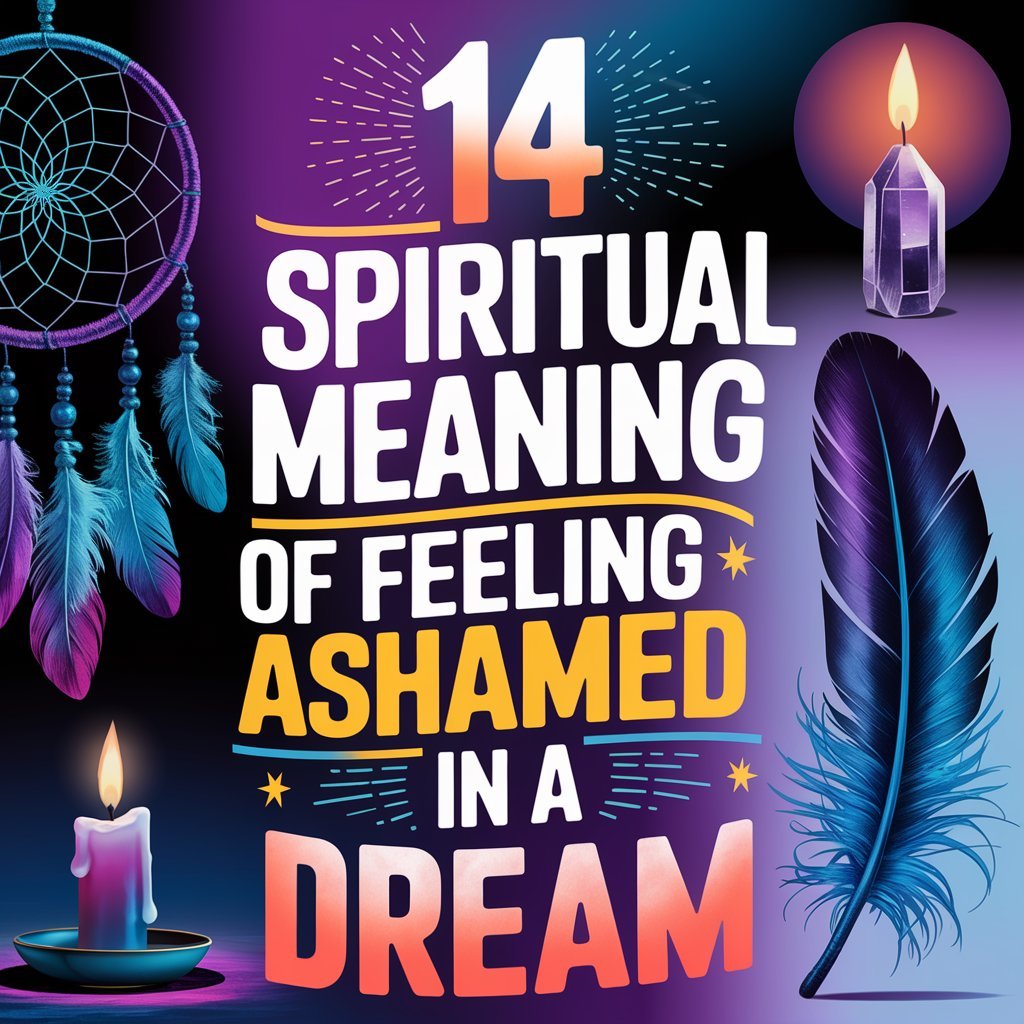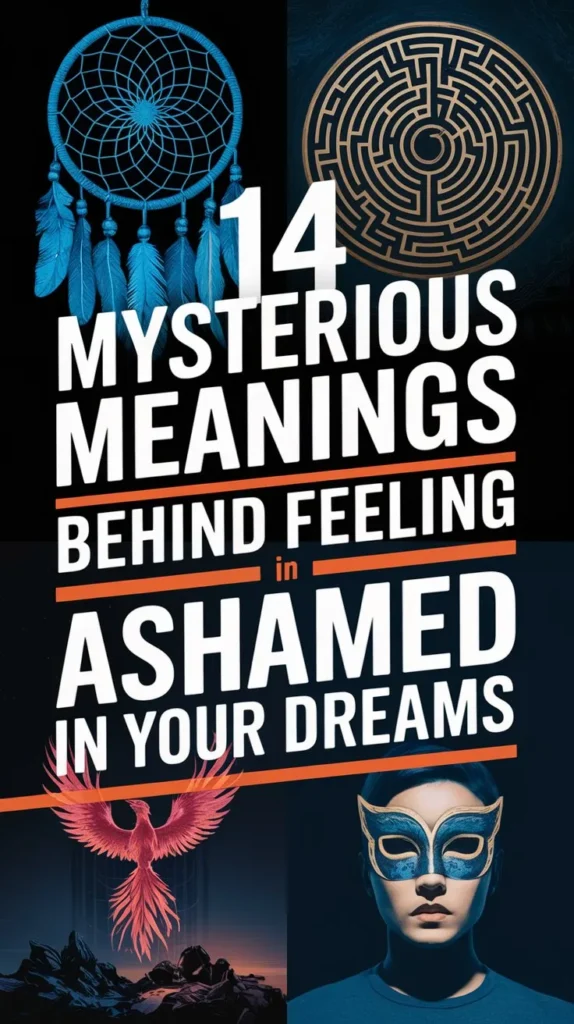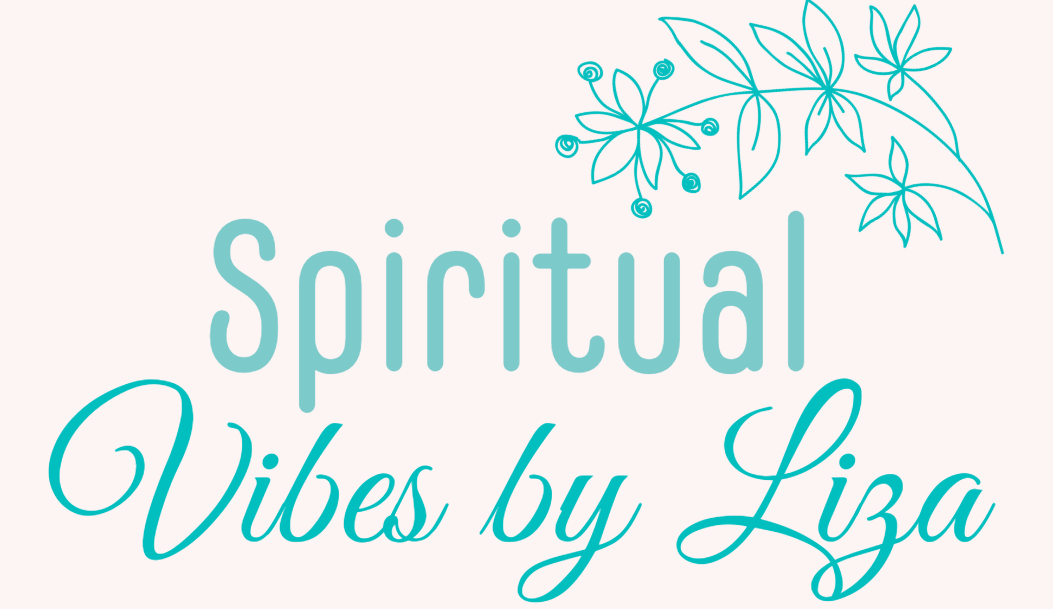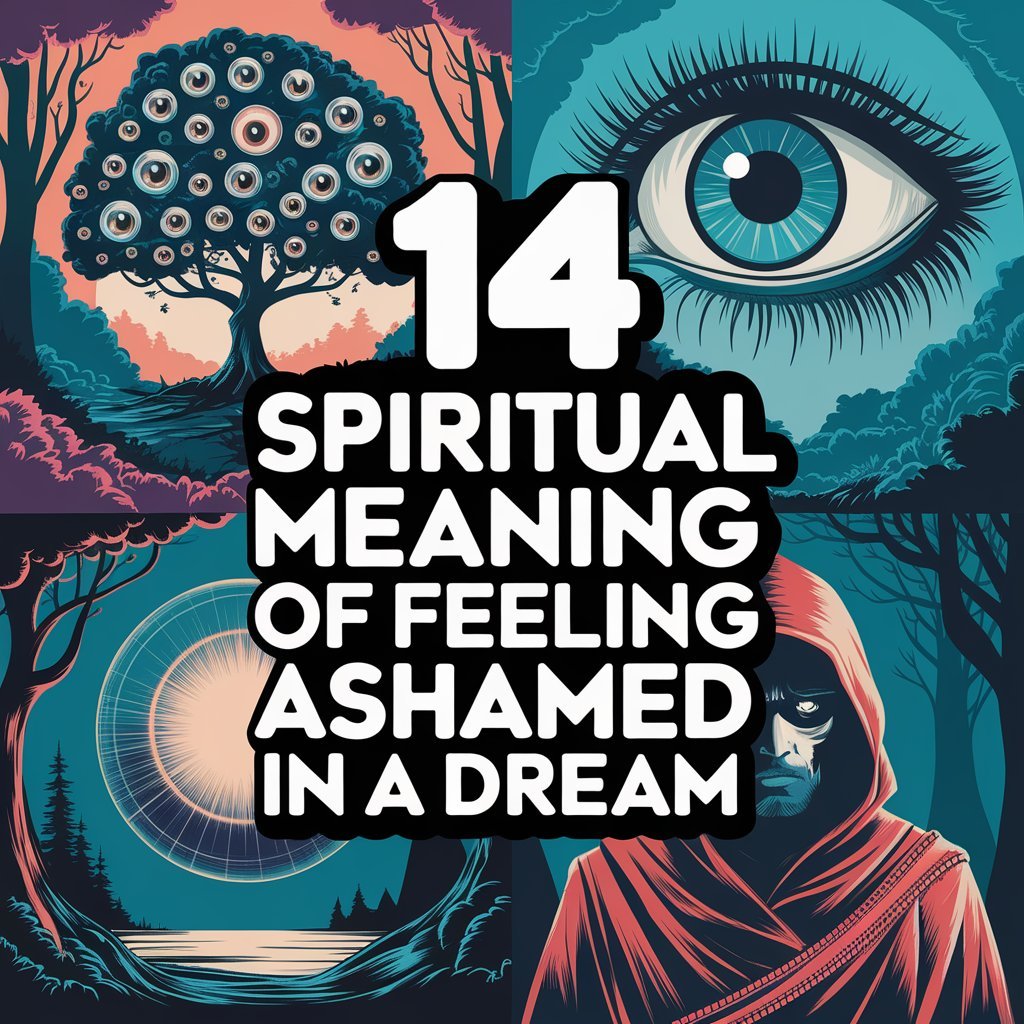14 Spiritual Meaning of Feeling Ashamed in a Dream: 14 Spiritual Secrets
You wake up with a lingering sense of shame, wondering why you felt so exposed and inadequate in your dream. But what if that feeling is trying to tell you something?
Perhaps it’s a signal that you’re hiding behind one of the 14 masks of self-deception, afraid to confront the parts of yourself that you’ve been trying to keep hidden. As you reflect on your dream, you start to wonder: which mask are you wearing, and what would happen if you dared to take it off?
In a Nutshell

- Feeling ashamed in a dream reveals hidden aspects of oneself that are desperate to be kept hidden, indicating a need for self-reflection and confrontation.
- Dreams can expose self-deception, encouraging recognition and acceptance of personal flaws, and leading to personal growth and self-awareness.
- Inauthentic relationships and people-pleasing patterns in dreams can symbolize self-deception, preventing meaningful connections and true self-expression.
- Suppressing emotions and presenting a flawless self-image can lead to internal conflict and shame, highlighting the need to confront and accept true emotions.
- Recognizing and apologizing for past mistakes or hurtful actions in dreams can help break the cycle of guilt and shame, promoting accountability and growth.
Fear of Being Found Out
As you navigate the subconscious landscape of your dream, the feeling of shame can be particularly unsettling, especially when it’s tied to the fear of being found out.
This fear can manifest as social anxiety, where you’re constantly worried about others discovering your secrets. You become a secret keeper, hiding aspects of yourself from the world, and even from yourself.
This weight of secrecy can be crushing, making you feel like you’re living a lie.
In your dream, this fear may take the form of being exposed or caught doing something shameful.
It’s as if your subconscious is revealing the hidden parts of yourself that you’re desperate to keep hidden. But what if this shame is actually a call to self-reflection?
What if it’s an opportunity to confront the parts of yourself that you’ve been trying to hide?
Denial of Personal Flaws
One of the most significant contributors to feelings of shame in your dreams is the denial of personal flaws.
You may have created a flawless self-image, but deep down, you know it’s not entirely accurate. This discrepancy between your true self and the image you project can lead to feelings of shame and inadequacy.
Your subconscious mind picks up on these inconsistencies, and your dreams reflect this internal conflict.
Your self-protection mechanisms kick in to shield you from the discomfort of acknowledging your flaws.
You may rationalize or justify your shortcomings, but this only serves to further conceal the truth from yourself. By denying your personal flaws, you’re preventing yourself from confronting and overcoming them.
This denial can manifest in your dreams as feelings of shame, embarrassment, or inadequacy.
Recognizing and accepting your flaws is the first step toward personal growth and self-awareness.
By embracing your imperfections, you can begin to work on them and develop a more authentic sense of self.
This, in turn, can help alleviate feelings of shame and promote a deeper connection with yourself and others.
Hiding Behind False Humility
Because you’re so adept at presenting a humble exterior, you may be surprised to discover that your dreams are revealing a deeper sense of shame.
You’ve mastered the art of pretending modesty, but your subconscious is calling you out on your fake meekness. Behind the mask of humility, you’re hiding a sense of inadequacy or unworthiness that’s begging to be acknowledged.
Your dreams may be showcasing scenarios where you’re trying to appear humble, but your actions or words betray a deeper arrogance.
This could be a sign that you’re overcompensating for feelings of shame or insecurity. By recognizing this pattern, you can begin to peel back the layers of self-deception and confront the root causes of your shame.
Inauthentic Relationships
In the shadows of your waking life, you may be harboring relationships that feel more like obligations than genuine connections.
These relationships can be draining, leaving you feeling unseen, unheard, and unvalued. You may maintain them out of social pressures, fear of rejection, or a deep-seated need for validation.
However, these inauthentic relationships can also be a reflection of your own self-deception, preventing you from forming meaningful connections with others and yourself.
Some signs of inauthentic relationships include:
- People-pleasing to avoid conflict or rejection, even if it means compromising your own emotional boundaries
- Feeling trapped or suffocated by the relationship, but staying due to a sense of duty or obligation
- Lacking a sense of vulnerability and intimacy, instead relying on superficial conversations or activities to fill the void
Recognizing these patterns is the first step towards breaking free from inauthentic relationships and cultivating ones that nourish your soul.
Living Someone Else’s Dream
Pursuing someone else’s vision of success can be a subtle yet suffocating form of self-betrayal, where you’re living a life that isn’t truly yours.
You may have convinced yourself that you’re on the right path, but deep down, you feel lost and unfulfilled.
This can lead to feelings of shame and inadequacy, as you struggle to meet the expectations of others.
You’ve sacrificed your own desires and passions to fit into someone else’s mold, leaving you with a lost identity.
You’re stuck in a cycle of trying to please others, rather than honoring your own dreams and aspirations.
The more you conform, the more you lose touch with your authentic self.
The unmet expectations of others can be crushing, and you may feel like you’re constantly falling short.
It’s time to take a step back and reassess your priorities.
What’re your true desires?
What makes you come alive?
It’s never too late to break free from the constraints of someone else’s dream and forge your own path.
Fear of Vulnerability
Many people struggle to confront their true selves, often hiding behind a mask of confidence or perfection.
You might be one of them, and that’s okay. It takes courage to admit that you’re afraid to be vulnerable.
When you’re faced with vulnerable moments, your fear responses kick in.
You might feel like you’re exposing yourself to judgment, rejection, or emotional pain. This fear can be overwhelming, causing you to put up walls and pretend to be someone you’re not.
- You avoid sharing your true feelings or thoughts, fearing they’ll be met with criticism or indifference.
- You put on a brave face, even when you’re struggling, to avoid appearing weak.
- You hide behind a mask of confidence, even when you’re feeling uncertain or insecure.
Mask of Perfectionism
Your pursuit of perfection is a clever disguise, one that you’ve carefully crafted to hide your true self from the world.
You’ve set unreal standards for yourself, and when you inevitably fall short, self-criticism kicks in. You beat yourself up over minor mistakes, convinced that anyone who sees your imperfections will reject you.
But the truth is, your pursuit of perfection is a shield, protecting you from the vulnerability of being seen and loved for who you truly are.
Behind this mask, you’re hiding a deep fear of not being good enough. You’re terrified that if people see your flaws, they’ll abandon you.
But in reality, it’s your perfectionism that’s driving people away. They can sense the pressure, the tension, and the unrealistic expectations you place on yourself and others.
Your dream of feeling ashamed is a reflection of this inner turmoil. It’s a call to drop the act, to let go of the need for perfection, and to embrace your authentic self.
Disguising True Intentions
Beneath the surface of your polished exterior, you’re concealing a secret: your true intentions aren’t entirely pure.
You’ve mastered the art of wearing social masks, hiding your real motives behind a facade of charm and charisma. But deep down, you know the truth – your actions are driven by hidden agendas, not entirely altruistic.
You’re not alone in this deception. Many of us wear these masks to gain approval, avoid rejection, or achieve success.
But the weight of these secrets can be crushing, leading to feelings of shame and anxiety in your dreams.
- You use flattery to manipulate others into doing your bidding, all while pretending to be a supportive friend.
- You present yourself as a selfless volunteer, but secretly hope to gain recognition and praise.
- You feign interest in someone’s life, only to use the information to your advantage in the future.
Overcompensating Insecurities
Feeling ashamed in a dream can also stem from overcompensating for deep-seated insecurities.
You may be trying too hard to prove yourself to others, fearing that they’ll see the “real” you and reject you. This constant need for validation can lead to social anxiety, causing you to put on a mask of confidence or perfection.
But deep down, you’re plagued by self-doubt, wondering if you’re truly good enough.
In your waking life, you might be overachieving or overcommitting to distract others (and yourself) from your perceived shortcomings.
This can lead to feelings of burnout, resentment, and frustration. Your dream is reflecting this inner struggle, revealing the emotional toll of trying to maintain a facade.
It’s exhausting to keep up the act, and your subconscious is urging you to confront these insecurities head-on.
Unwillingness to Apologize
Shadows of unresolved conflicts linger in your dreams, manifesting as feelings of shame.
This sense of shame may stem from your unwillingness to apologize for past mistakes or hurtful actions. Your dreams are urging you to confront the unspoken regret that weighs heavily on your heart.
- You may be stuck in prideful silence, refusing to acknowledge the harm caused to others or yourself.
- Unwillingness to apologize can create a sense of disconnection, causing you to feel isolated and ashamed.
- By avoiding accountability, you’re perpetuating a cycle of guilt and shame that will continue to haunt your dreams until you take responsibility for your actions.
Blame Shifting and Projection
Your dreams may be reflecting a pattern of blame shifting and projection, where you deflect accountability by attributing your mistakes to others or circumstances.
This can manifest in your waking life as a tendency to point fingers, making excuses, or rationalizing your actions. By doing so, you’re deflecting responsibility and shirking accountability, avoiding the discomfort of acknowledging your own shortcomings.
In your dream, feeling ashamed may be a sign that your subconscious is urging you to take ownership of your actions.
Crucially, recognize that blame shifting and projection are coping mechanisms that prevent you from growing and learning from your mistakes.
By confronting these patterns, you can begin to develop a more authentic sense of self and take steps towards personal growth.
Remember, accountability isn’t about self-blame, but about acknowledging your role in a situation and making amends when necessary.
Playing the Victim Role
Your dreams may be revealing a tendency to play the victim role, where you perceive yourself as helpless, powerless, or mistreated.
This mindset can be a clever way to avoid taking responsibility for your actions and emotions, allowing you to shift the blame onto others.
However, crucially, recognize that playing the victim can lead to a victim mentality, where you feel sorry for yourself and expect others to rescue or pity you.
- You might be using emotional manipulation to control others, making them feel guilty or responsible for your well-being.
- By playing the victim, you’re giving away your personal power and agency, allowing others to dictate your emotions and decisions.
- This role can also prevent you from confronting and resolving your inner issues, as you’re too busy pointing fingers at others or circumstances.
False Sense of Accomplishment
As you explore the underlying causes of feeling ashamed in your dream, you may uncover a pattern of relying on superficial achievements to mask underlying insecurities.
You’ve probably convinced yourself that you’re accomplished, successful, and respected, but deep down, you’re still plagued by feelings of inadequacy.
This false sense of accomplishment can lead to pretentious achievements, where you prioritize external validation over genuine self-improvement.
You might boast about your achievements on social media, seeking validation from others to compensate for your own self-doubt.
But beneath the surface, you’re still struggling with feelings of shame and inadequacy.
Self-delusional pride can be a major obstacle to personal growth, as it prevents you from confronting your true weaknesses and flaws.
By recognizing this pattern, you can begin to strip away the facade of superficial success and focus on cultivating genuine self-awareness and self-acceptance.
Suppressing Emotions
Behind the mask of confidence, you’ve been harboring a secret: unresolved emotions that threaten to sabotage your sense of self-worth.
You’ve learned to suppress them, to hide behind a façade of strength and control. But the truth is, those emotions are still there, simmering beneath the surface, waiting to erupt.
- They manifest as emotional baggage, weighing you down and holding you back from truly connecting with others.
- They create hidden insecurities, whispering doubts and fears that make you question your own abilities.
- They lead to self-deception, causing you to present a false version of yourself to the world, rather than embracing your true, imperfect self.
Frequently Asked Questions
Can I Overcome Shame by Focusing on My Strengths Instead of Weaknesses?
You can overcome shame by shifting focus to your strengths, practicing self-worth exercises that amplify your positives, and embracing empowerment strategies that help you own your worth, rather than dwelling on weaknesses that drain your confidence.
How Do I Distinguish Between Shame and Guilt in My Dreams?
You start by recognizing shame’s heavy, crippling feeling in your dreams, versus guilt’s lighter, regretful tone. Through dream journaling, you identify shame triggers, then gently explore their roots, allowing you to distinguish between the two and begin your healing journey.
Does Feeling Ashamed in a Dream Always Indicate Self-Deception?
You explore your dream’s hidden corners, wondering if shame always reveals self-deception. Through dream analysis, you uncover subconscious patterns – and it’s not always a yes; sometimes, shame serves as a catalyst for growth, urging you to confront and overcome hidden fears.
Can Recurring Ashamed Dreams Indicate a Specific Unresolved Issue?
When you’re haunted by recurring ashamed dreams, you’re likely confronting hidden insecurities and unresolved traumas that linger in your subconscious, urging you to face and overcome these deep-seated emotional wounds, ultimately freeing yourself from their grip.
Is It Possible to Overcome Shame Without Confronting My Past?
You can start to let go of shame without directly confronting your past by recognizing how past triggers still affect you, and gently silencing your inner critic, allowing you to gradually develop a more compassionate relationship with yourself.
Conclusion
As you confront the shame in your dreams, remember that it’s not a reflection of your worth, but a call to authenticity. You’re being invited to peel away the masks that hide your true self. By acknowledging and releasing these patterns of self-deception, you’ll break free from the burdens of secrecy and shame, embracing a more genuine connection with yourself and others. Embrace this opportunity for growth, and let your true essence shine through.







Liza Anderson is a spiritual enthusiast and the creator of Spiritual Vibes by Liza. With a heart full of compassion and a soul driven by the quest for universal harmony, Liza dedicates her life to guiding others on their spiritual journey. Her blog serves as a beacon for those seeking enlightenment, offering a blend of wisdom, tranquility, and insight into the mysteries of the cosmos.







